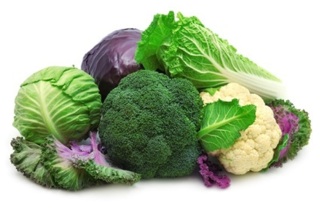- There are so many vitamins, minerals in cruciferous vegetables, we can learn our alphabet with them.
- They truly are nature’s multi-vitamins.
- Eating cruciferous vegetables on a regular basis will get you a good amount of vitamin A, B, C, K not to mention some folic acid and potassium and of course fiber.
- TIP: Eat raw or slightly cooked to get the full benefits.
- Why the term ‘cruciferous’? It is because of the four-petal flowers who resemble a cross or “crucifer,” Broccoli is probably the best known cruciferous vegetable. Some scientists are now favoring the term “brassica vegetables“. In Latin, the word “brassica” means “cabbage,” which is a featured member of this vegetable group.
- Who are these potent veggies?
- Arugula
- Bok choy
- Broccoli
- Brussels sprouts
- Cabbage
- Cauliflower
- Chinese cabbage
- Collard greens
- Daikon radish
- Horseradish
- Kale
- Kohlrabi
- Land cress
- Mustard greens
- Radish
- Rutabaga
- Shepherd’s purse
- Turnip
- Watercress
- The health benefits of cruciferous vegetables are many:
- Cancer-preventing:
- These super veggies are linked to cancer prevention and help reduce free radicals in the body.
- They contain a nutrient known as glucosinolates. Upon digestion, this compound can help to eliminate carcinogens before they damage or alter DNA. It helps prevent healthy cells from converting to malignant cells that lead to cancer. Cruciferous vegetables can prevent lung, breast and prostate.
- Eye health:
- They are good for cataracts, as they have a carotenoid known as lutein found in most cruciferous vegetables appears to be of the most benefit.
- Hearth health:
- Including them in your diet can help prevent cardiovascular disease. They protect against heart disease, largely due to their high concentration of vitamin C and beta-carotene. A study conducted by the Department of Epidemiology at Harvard School of Public Health demonstrated a 4-percent lower risk of coronary heart disease as a result of one serving a day of fruits and vegetables. Those that are high in vitamin C, such as cruciferous vegetables, appear to be the most effective. The beta-carotene found in these vegetables decreases the risk of death from cardiovascular disease.
- Stroke-preventing:
- Diets rich in cruciferous vegetables may also help reduce the risks of ischemic stroke. According to another study by the Department of Epidemiology, one serving of fruits or vegetables a day can lower the risk of a stroke by 6 percent. Vegetables in the cruciferous family were found to be the most protective, along with green leafy vegetables and citrus fruits.
- For the health benefits of broccoli.
- For the health benefits of arugula.
- As always: Check with your health practitioner before you change your diet and see if this is right for you. These foods are not meant to replace any treatment or drugs you are taking.
- REFERENCES:
- Linus Pauling Institute:“Cruciferous Vegetables“
- The Journal of the American Medical Association: “Fruit and Vegetable Intake in Relation to Risk of Ischemic Stroke”; K. J. Joshipura, et al.; 1999
- http://www.ncbi.nlm.nih.gov/pubmed/10736624
- http://www.cancure.org/cancer_fighting_foods.htm
- http://en.wikipedia.org/wiki/Cruciferous_vegetables
- http://www.lotussurvivalfoundation.org
- http://www.naturalnews.com/036841_probiotics_cancer_prevention.html
- http://www.diet.com/g/cancerfighting-foods
- http://www.cancer.gov
- Cancer – MedlinePlus Health Information


















Pingback: 10 reasons to eat broccoli